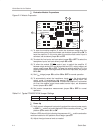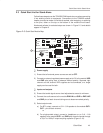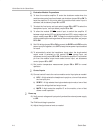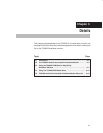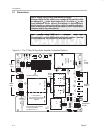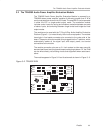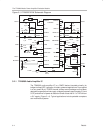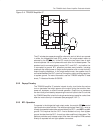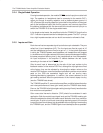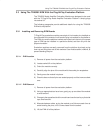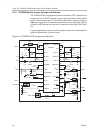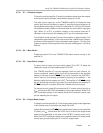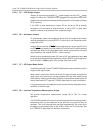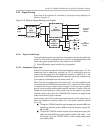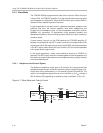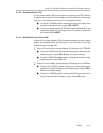
The TPA0202 Audio Power Amplifier Evaluation Module
3-6
Details
3.2.4 SIngle-Ended Operation
For single-ended operation, the module SE/BTL control input pin must be held
high. The speaker (or headphone) load is connected to the module OUT+
output pin through a coupling capacitor, and to platform/system ground. A
470-µF electrolytic coupling capacitor is provided on the platform in the signal
path to the headphone output jack for this purpose, and a control signal from
the platform headphone jack can be routed to the module control input pin to
switch the TPA0202 IC to the single-ended mode.
In the single-ended mode, the amplifiers inside the TPA0202 IC that drive the
OUT– lines do not operate and do not dissipate any power. The OUT– pins go
into a high-impedance state and can be left connected or allowed to float.
3.2.5 Inputs and Gain
Each channel has two separate signal inputs that are pin-selectable. They are
called
line (L)
and
headphone
(
HP
). The line inputs are fixed at a gain of 10
and the headphone inputs are fixed at a gain of –1. In the typical application
in which the TPA0202 powers small speakers until headphones are plugged
in, the difference in the gain selected for the two inputs provides approximately
the same perceived listening level in the headphones as from the speakers.
An input multiplexor in the amplifier IC selects between the two inputs
according to the state of the HP/LINE
IC pin.
Gain for each input is determined by the ratio of the input resistor to the
feedback resistor on the module PCB. And, although the input gains are fixed
at the factory, they can be adjusted by changing the resistor values on the
module PCB. However, care must be taken because the surface-mount solder
pads on the PCB are somewhat fragile and will not survive many
soldering/desoldering operations. In addition, the values selected for the
gain-setting resistors affect the performance of the internal depop circuitry
(see the TPA0202 data sheet).
The TPA0202 amplifier IC, as most other amplifiers, exhibits its best distortion
and noise performance at lower gain levels (see the TPA0202 data sheet).
Even so, the TPA0202 at its highest gain setting has significantly less distortion
than most low-cost speakers.
Gain versus total harmonic distortion (THD) should be considered in each
application. Both the module input signal level and the TPA0202 module gain
should be adjusted to obtain the lowest overall distortion level for a particular
overall gain. A quick rule of thumb (everything else being equal): the module
input signal level should be as high as possible without clipping or overloading
the TPA0202 input, and the TPA0202 gain should be kept as low as possible.



